
Epluribus Unum: Out of Many, One. This motto, our national motto, highlights exactly what this nation is: a union of fifty different states, each with its own unique issues and dilemmas. The founders of this nation understood this; they knew that what may plague a farmer in Nebraska may not be an issue for a financier in New York, and it is for this reason that they created the electoral college. By having a system that necessitates the participation of smaller states, a larger diversity of experiences and opinions is brought into the electoral process. Therefore, the electoral college must be preserved as the way to determine the winner of a presidential election.
The electoral college also allows for the possibility of swing states. Without it, elections would be won and lost almost solely in densely populated coastal cities. There would be no need to campaign in “fly over” states like Wisconsin, even though the people in these states deserve just as much of a right to participate in elections as the people in New York.
Recently, it has been proposed by constitutional scholars that the electoral college was created as a tool to increase the power of slave-holding Southern states in our election process. This, however, is not true. The electoral college had absolutely nothing to do with the Three-Fifths Compromise, which defined a slave as three-fifths of a person. The compromise is related to the appointment of representatives, which is not how electors are chosen or how electoral votes are apportioned. The electoral college is, instead, rooted in the New Jersey Plan, the deal that created the Senate to give small states more equal representation. That is why a state’s electoral vote is the combination of its house and senate seats — to give states with fewer house seats more representation in the electoral process.
For this reason, the abolitionist New Jersey representative and author of the New Jersey Plan, William Patterson, was a strong advocate of the electoral college while both the New York and Pennsylvania representatives were not. It limited the power of larger states like New York and Pennsylvania in the presidential election by giving more power to smaller states like New Jersey, therefore giving each state a more equitable stake in the presidential election.
To see how the electoral college gives smaller states more representation, one must examine the disparities in voting power between larger and smaller states when using just the popular vote. In a popular election, California, with its over 18 million registered voters, has more than 70 times as much of a say in an election as Wyoming does. But with the electoral college, California has only 18 times as much of a say as Wyoming does. This still means that California, as a larger state, has a proportionally greater amount of power, but it also means that the beliefs of Wyoming’s citizens are not completely drowned out by the beliefs of those in California.
With the electoral college, we are reminded to not ignore smaller states in the presidential election. As American citizens, the residents of said states also deserve the ability to elect their president. The electoral college is absolutely essential if we want to become a “more perfect union” of 50 equally important states.




